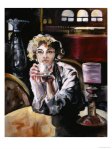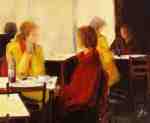 At the moment I’m re-reading Geraldine Brooks wonderful book March in preparation for a book group meeting a week tomorrow. The edition I have includes an article by the author in which she quotes Henry James on the subject of historical fiction. Mr James was not amused. He wrote:
At the moment I’m re-reading Geraldine Brooks wonderful book March in preparation for a book group meeting a week tomorrow. The edition I have includes an article by the author in which she quotes Henry James on the subject of historical fiction. Mr James was not amused. He wrote:
‘The historical novel is, for me, condemned. You may multiply the little facts that can be got from pictures and documents…as much as you like, but the real thing is almost impossible to do…’
Not surprisingly Ms Brooks does not agree and, for the most part, I’m with her. I enjoy well-written historical fiction and I think you can learn a lot about not only the facts but also the feeling of what it was like to live in times other than our own, but…
Oh yes, there is always a but. Sometimes that multiplicity of little facts that James talks about can become an avalanche under which the story is suffocated. Over the past three or four years there has been a spate of books mostly, but not always, historical, which seem to me, and I have to add to many of my reading friends, to have suffered from what you might call the warts and all principle. Their authors have done their homework to the nth degree. Their research is meticulous. It can’t be faulted. And you know it can’t be faulted because you can read it all, every last reference, every last footnote, every last little fact, right there on the page. You don’t so much read these books as mine your way through them, hoping beyond hope that you will eventually reach the seam of gold that is the story and that, if you do find it, it will still be alive and well.
Sometimes, you feel you can forgive the writer. (Although, I have to say that some readers are more forgiving than others. My friend Mary and I have had some right ding dong discussions about what is acceptable and what isn’t.) For me, one such occasion was Elizabeth Kostova’s first novel, The Historian. It contained so much information I could really have done with a notepad and pencil by me all the time to keep track of everything. And yet, at the core there was a fine story that was worth the effort it took to dig it out. Kostova is a writer to be watched, I feel, and I’m very glad to see that she has a new novel, The Swan Thieves, due out in the new year. I hope she will have refined her technique and that the resulting book will be sharper. At a projected 400 pages it’s still hefty but, nevertheless, over 300 pages shorter than that first novel.
This week, however, I have had a rather different experience. I’ve had to give up on a book by one of my favourite writers because over a hundred pages in I was still trying to claw my way through the spoil pile of her research in order to find a story that I was beginning to suspect might not be there to find in the first place. Note, ‘one of my favourite writers’, this is no first time author not yet sensitive to how much detail should or should not find its way onto the page. This is a writer with over twenty historical novels behind her and a rightly-deserved fan base that must run into six figures at least.
I think what may have gone wrong in this case is that the author has changed her period and that as a result she is not as confident as she should be about what the reader does or doesn’t need to know. There is a sense almost of her reassuring herself that she knows enough about this new world to be able to write about it. And, if that is the case, then I have to ask the question, where was the editor? This is a question I seem to return to again and again. Too many books recently have reached the shelves before they are properly ready. In some instances the problem has been major faults in the way the story is fashioned, as here, in others the difficulties have had more to do with the quality of the proof-reading, which I know can never be perfect, but which nevertheless seems to be of less and less importance these days.
OK, so it’s been a bad week and maybe I’m feeling grouchy. Am I alone in the blogging world in feeling this way? Or are there others who have encountered similar problems? Let me know what you think.
 I’ve just finished Strange Affair, the second of two Peter Robinson crime novels which I’ve listened to in audio format rather than reading. I have read some of his earlier work but have not been the devotee that some of my friends are. Indeed I have one friend who deliberately saves his new novel each year for her Christmas treat and retires behind closed doors with that and a bag of fudge not to be seen again until she has finished both.
I’ve just finished Strange Affair, the second of two Peter Robinson crime novels which I’ve listened to in audio format rather than reading. I have read some of his earlier work but have not been the devotee that some of my friends are. Indeed I have one friend who deliberately saves his new novel each year for her Christmas treat and retires behind closed doors with that and a bag of fudge not to be seen again until she has finished both. Just two quick points today, quick because of the first of them.
Just two quick points today, quick because of the first of them.